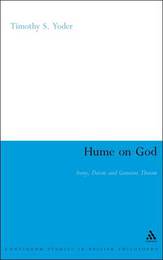
|
Hume on God: Irony, Deism and Genuine Theism
Paperback / softback
Main Details
| Title |
Hume on God: Irony, Deism and Genuine Theism
|
| Authors and Contributors |
By (author) Dr Timothy S. Yoder
|
| Series | Continuum Studies in British Philosophy |
|---|
| Physical Properties |
| Format:Paperback / softback | | Pages:186 | | Dimensions(mm): Height 234,Width 156 |
|
| Category/Genre | Western philosophy - c 1600 to c 1900 |
|---|
| ISBN/Barcode |
9781441122834
|
| Classifications | Dewey:210 |
|---|
| Audience | | Postgraduate, Research & Scholarly | | Professional & Vocational | |
|---|
| Edition |
NIPPOD
|
|
Publishing Details |
| Publisher |
Continuum Publishing Corporation
|
| Imprint |
Continuum Publishing Corporation
|
| Publication Date |
29 December 2011 |
| Publication Country |
United States
|
Description
David Hume, one of the most influential philosophers to have written in the English language, is widely known as a skeptic and an empiricist. He is famous for raising questions about the existence of things for which there is insufficient empirical evidence, such as souls, the self, miracles, and, perhaps most importantly, God. Despite this reputation, however, Hume's works contain frequent references to a deity, and one searches in vain to find a positive assertion of atheism. This book proposes a different reading of Hume on God, in which Hume is seen as proposing a 'genuine theism'. Yoder investigates Hume's use of irony and his relationship with the Deists of his era and offers a thorough re-examination of Hume's writings on religion. Yoder concludes that, despite Hume's criticisms of the church, religiously-based ethics and the belief in miracles, he stops well short of a rejection of the existence of God. Always a creative thinker, Hume carves out a unique conception of the divine being.
Author Biography
Timothy S. Yoder (Ph.D. Marquette University) is Associate Professor of Philosophy at Philadelphia Biblical University in Langhorne, PA, USA.
Reviews"Yoder argues that Hume is not a complete skeptic regarding religion, but instead affirms a "true religion" of "genuine theism" in continuity with his defense of mitigated skepticism. Yoder's study is especially valuable for his response to the tendency to dismiss certain passages in Hume's writings as ironic. Instead, Yoder develops a set of hermeneutical principles for deciding when Hume is using irony, and concludes that Hume's positive statements concerning the existence of a deity are not ironic. Yoder's interpretation of Hume's writings on religion will remain an important contribution to the literature." - Dr Claudia Schmidt, Marquette University, USA
|